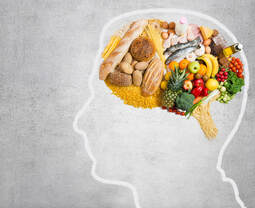|
Prebiotic foods include soluble fibers that further the growth and activity of good bacteria, such as bananas or onions. Yogurt and pickles are sources of probiotics, good bacteria that are already in your gut.
According to the National Institute of Mental Health, “Nearly one in five U.S. adults live with a mental illness.” (NIMH) Studies show that the risk of depression is 25-35% lower in individuals who eat traditional diets since they tend to avoid processed and refined foods. For comparison, we can look at the American diet and the Mediterranean diet. Typical staples of an American diet are high intakes of red meat, processed meat, dairy, sugars, and fast foods. These items cause inflammation in the gut area as well as oxidative stress which results in increased mood disorder symptoms like depression. In contrast, a Mediterranean diet has plant-based meals indicating lots of fruits, vegetables, nuts, and seeds. The diet also allows for moderate amounts of dairy, poultry, and seafood while keeping red meat a rare occurrence. This field is important to me because I have struggled with anxiety in the past and understand how difficult it is to maintain a good mood. Oftentimes, I would avoid eating as it worsened my mental health. During these crazy COVID-19 times where many of us are at home in isolation, it is easy to slip into non-healthy eating habits which can result in increased depression symptoms. Try cutting out certain foods from your diet and observe how you feel after a week. Substitute processed and packaged food with whole foods and fibers. Antidepressant nutrients include iron, vitamin C, and zinc. Replace sugary desserts with a serving of fresh fruit and dark chocolate. However, this doesn’t mean that you can’t enjoy an occasional McDonald’s meal or Oreo sundae! Bibliography “Mental Illness.” National Institute of Mental Health, U.S. Department of Health and Human Services, 2019, www.nimh.nih.gov/health/statistics/mental-illness.shtml#:~:text=Mental%20illnesses%20are%20common%20in,mild%20to%20moderate%20to%20severe. Mutsuoka, Yutaka, and Kei Hamazaki. “[Considering Mental Health from the Viewpoint of Diet: The Role and Possibilities of Nutritional Psychiatry].” Seishin Shinkeigaku Zasshi = Psychiatria Et Neurologia Japonica, U.S. National Library of Medicine, 2016, pubmed.ncbi.nlm.nih.gov/30620820/. Naidoo, Umadevi. “Nutritional Psychiatry: The Gut-Brain Connection.” Psychiatric Times, Jan. 2019, www.psychiatrictimes.com/view/nutritional-psychiatry-gut-brain-connection. Selhub, Eva. “Nutritional Psychiatry: Your Brain on Food.” Harvard Health Publishing, 2020, www.health.harvard.edu/blog/nutritional-psychiatry-your-brain-on-food-201511168626. “Shifts Needed To Align With Healthy Eating Patterns.” Current Eating Patterns in the United States – 2015-2020 Dietary Guidelines, 2020, health.gov/our-work/food-nutrition/2015-2020-dietary-guidelines/guidelines/chapter-2/current-eating-patterns-in-the-united-states/. Wolfgang, Marx, et al. “Nutritional Psychiatry: the Present State of the Evidence.” The Proceedings of the Nutrition Society, U.S. National Library of Medicine, 2017, pubmed.ncbi.nlm.nih.gov/28942748/. Comments are closed.
|
|

